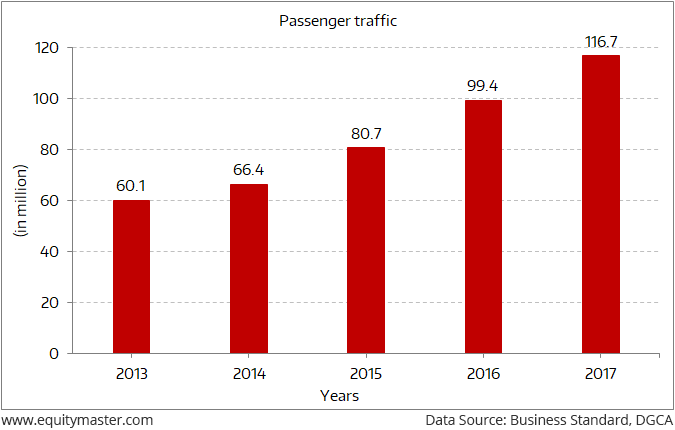Sensex Up 200 Points; Realty Stocks Gain
After opening the day in green, share markets in India witnessed positive trading activity throughout the day and are presently trading above the dotted line. Sectoral indices are trading on a mixed with stocks in the banking sector and stocks in the realty sector leading the gains, while stocks in the capital goods sector are trading in red.
The BSE Sensex is up by 207 points (up 0.6%) and the NSE Nifty is trading up by 52 points (up 0.5%). Meanwhile, the BSE Mid Cap index is trading up by 0.1%, while the BSE Small Cap index is trading up by 0.3%. The rupee is trading at 68.07 to the US$.
In news from stocks in the aviation sector. After the government's attempt to sell a stake in Air India drew a blank again, the government has decided not to go ahead with Air India stake sale.
The government put off its plans to sell a 76% stake in the national carrier and will provide funds required for its operations. Reportedly, Air India has sought immediate restoration of Rs 22 billion equity infusion from the government to meet its operational requirements.
The decision to put off the stake sale comes after the government failed to attract bidders for the airline despite repeated deadline extensions. The government on 1 May extended the privatization process of Air India by a fortnight and clarified various knotty issues identified by potential bidders.
Notably, Jet Airways ruled out a bid for debt-laden national carrier Air India citing unfavorable terms of the offer.
The announcement came 3 weeks after rival IndiGo pulled out of the race to acquire Air India's operations meaning the government now has no clear frontrunner in the sale campaign.
Once the country's monopoly airline, Air India has slowly lost market share to new low-cost private players in one of the world's fastest-growing airline markets.
Indian Aviation Spreading its Wings

Air travel has recorded double-digit growth for 40 consecutive months, thanks to low fares, the addition of new flights/destinations, and overall growth in the economy.
What's foreseeable for India's aviation traffic in 2018 is some pressure on the back of the consistent rise in crude oil prices. Earlier this month, Brent crude oil briefly breached US$80 per barrel and touched its highest level since December 2014. Crude prices have been driven up by production curbs in OPEC nations and Russia, as well as by robust demand on the back of healthy global economic growth.
Oil prices are closely monitored by the Indian air carriers, as aviation turbine fuel is their single largest input cost. A sharp rise in the cost of fuel puts pressure on margins, and consequently an increase in airfares.
Although air travel is becoming the new normal, investors need to understand the industry dynamics before buying up aviation stocks.
Moving on to news from stocks in the auto sector. In a bid to boost infrastructure for electric vehicles (EVs), the government is planning to appoint state-owned power distribution companies, central public-sector undertakings and municipal corporations as nodal agencies for setting up a EV charging stations across the country.
The government wants these agencies to create a minimum skeleton network of more than 4,000 electric vehicles charging infrastructure in identified cities and highways.
Reportedly, central government is also working on a policy for electric vehicle charging infrastructure as per which the designated government agencies such as NTPC, Power Grid Corporation of India, state power discoms and select municipal authorities will have to identify locations and set up charging infrastructure in the assigned cities and on select highways within one year. They will have to operate the stations for at least three years.
These measures will do well to boost EV adoption in India.
Currently, electric vehicle sales are low in India, rising 37.5% to 22,000 units in the year ended 31 March 2016 from 16,000 in 2014-15. Only 2,000 of these were cars and other four-wheelers, according to automobile lobby group Society of Indian Automobile Manufacturers (Siam).
The government wants to see 6 million electric and hybrid vehicles on Indian roads by 2020 under the National Electric Mobility Mission Plan 2020.
The government is targeting to have all cars propelled by electric engine by 2030. The target is more daunting than in many advanced countries.
According to the industry, the 2030 target would require eight to ten times the global stock of such vehicles. India would need to sell more than 10 million electric cars in 2030, compared to 5,000 electric vehicles India had on the road in 2016.
As an article in Business Standard suggests, such a big jump in scale for the auto industry in 13 years seems difficult. The basic infrastructure is missing. There are not enough charging stations. For this massive shift, the charging stations will need to be as ubiquitous as petrol pumps.
Another issue is the price of the lithium-ion battery, which constitutes 30% to 40% of the cost of the car. For this plan to succeed, the price of the battery needs to come down.
The auto industry is already facing regulatory headwinds. The shift from BS-IV emission norms to BS-VI has been two years ahead of schedule without an intermediate stage. The government, if it is serious about such ambitious targets, should offer the necessary infrastructure support and do its bit for a smooth transition.
Disclosure: Equitymaster Agora Research Private Limited (hereinafter referred as 'Equitymaster') is an independent equity research Company. Equitymaster is not an Investment Adviser. ...
more


